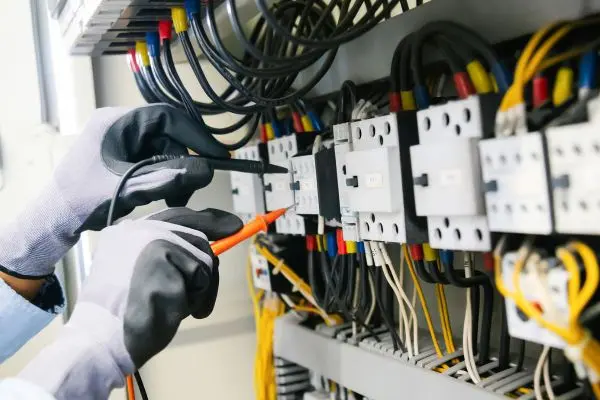Electrical engineer online courses: How to apply free
Discover how to apply for electrical engineer online courses for free and start building your future from home!
Anúncios
How Do Electrical Engineer Online Courses Work?
Online electrical engineer courses are 100% digital
That means you can study anytime, anywhere—even during your free time at night or between jobs
They’re divided into modules, which usually include video classes, quizzes, PDFs, and even simulations of real-life projects
The pace is flexible. You can watch classes at your own rhythm, pause to take notes, or repeat lessons as many times as you need
Most platforms offer support via chat or email if you have questions
And some even have community forums, where students like you help each other and share tips
At the end of the course, you can usually download a certificate
That certificate can be used to build your resume, apply for internships, or simply show your effort to recruiters
Some platforms even link you to job offers or practical projects

Step-by-Step Guide to Apply for Electrical Engineer Online Courses
Applying for an electrical engineer online course is much easier than it sounds.
You don’t need to leave your home, face long lines, or have advanced computer skills.
All it takes is a little attention and a few simple steps to start studying today.
Follow the step-by-step guide below and secure your spot for free.
1. Choose a Reliable Platform
To start your electrical engineer online courses, the first step is to pick a trustworthy learning platform.
Here are the best and most reliable options in the U.S.:
- Coursera – Offers free courses from top universities like Stanford and Duke (certificates optional).
- edX – Provides high-quality content from MIT and Harvard, with free learning and paid certificates.
- MIT OpenCourseWare – 100% free MIT courses with full materials, no certificate required.
- Udemy – Affordable courses with video lessons and certificates (many are free during promotions).
- Alison – Free courses with optional certificates, great for beginners and low-income students.
- FutureLearn – International platform with electrical courses from universities, free to join.
- Khan Academy – Free lessons in circuits, physics, and math to prepare for engineering topics.
- LinkedIn Learning – Free trial available, professional courses with certificates for your resume.
Choose one that fits your level and study style, and get ready to learn from anywhere!
2. Register for Free on the Website
Go to the official website of the chosen platform.
Click on the button that says “Sign Up” or “Create Account”.
Fill in your personal details like:
- Full name
- Email address
- Password
If asked, confirm your registration through the email they send you.
Always check your spam box in case the confirmation email doesn’t show up right away.
3. Search for Electrical Engineer Online Courses
Once logged in, look for the search bar and type terms like:
- “Electrical engineering”
- “Basic electricity”
- “Electric circuits”
- “Electronics for beginners”
If you’re on a Brazilian platform, try searches like:
- “Curso de elétrica básico”
- “Eletricidade residencial”
- “Noções básicas de engenharia elétrica”
Then, use the filters to find only free courses or those for beginners.
Read the course descriptions carefully before clicking to enroll.
4. Enroll in the Course
Click on the course that interests you most.
Look for the “Start Course” or “Enroll Now” button.
Some platforms ask a few questions before the course begins, like your area of interest or level of knowledge.
This helps personalize your experience.
After confirming enrollment, the content will be released in your account.
5. Start Studying Right Away
Choose a quiet place, plug in your headphones, and dive into the first lesson.
The classes are usually divided into modules, which you can do little by little—without pressure.
You can pause the videos, take notes, and repeat the lessons whenever you want.
Use a notebook or app to write down important points and formulas.
The most important thing is to stay consistent—study a little every day, even if it’s just 15 minutes.
6. Complete Exercises and Quizzes
Most electrical engineer online courses include mini-tests at the end of each module.
These quizzes help reinforce what you’ve learned.
Don’t be afraid to get questions wrong—they’re part of the learning process.
Some courses require you to score a minimum percentage to move on to the next topic.
Take your time, reread if needed, and only move forward when you feel secure.
7. Earn and Download Your Certificate
When you finish all modules and pass the final test, you’ll receive a certificate.
It usually becomes available in PDF format, ready to print or attach to your resume.
Save this document on your phone, computer, or Google Drive.
Use it to apply for jobs, share on LinkedIn, or show your progress in interviews.
Some platforms also let you share your certificate directly on social media.
That increases your chances of being seen by recruiters and companies.
8. Keep Practicing After the Course
The certificate is just the beginning of your journey.
Use the knowledge gained to:
- Do simple installations at home
- Help friends or family with basic repairs
- Apply for internships or entry-level jobs
- Enroll in more advanced courses
Stay curious.
The more you study and practice, the greater your chances of success.
Why Take an Electrical Engineer Online Course?
Electrical engineering is one of the most sought-after professions in the technical job market
Even in times of crisis, electricians, installers, and technicians are still in high demand
Here are some reasons why studying online is worth it:
- You don’t need to travel or spend money on transportation
- You study on your own time
- You can review the content as many times as needed
- You gain a certificate that increases your chances of being hired
- It’s a step toward technical school or a university degree
It’s a practical way to improve your life—starting today
Who Are These Courses For?
These online courses are especially useful for:
- Young people looking for their first job
- Unemployed people who want to change careers
- Mothers or fathers who want to study without leaving home
- People from rural areas with limited access to in-person schools
- Workers who want to grow in their company
No matter your age, experience, or level of education, these courses are designed to be accessible to all
They use simple language, have visual explanations, and many are taught by instructors who understand the reality of those who are just beginning
You don’t need to know mathematics in depth or have experience with machines to start
What matters most is your willpower
Can You Trust These Free Electrical Engineer Online Courses?
Yes, as long as you choose reliable platforms
Most of them are funded by large institutions or part of social education programs
Certificates are valid and recognized in many companies
Of course, not all free courses are of the same quality
That’s why it’s important to check reviews, comments from other students, and whether the platform is well known
Avoid unknown sites that ask for credit card info or strange downloads
The safer the platform, the better your learning and chances in the job market
Real-Life Benefits After Completing the Course
After finishing one of these online electrical engineer courses, many students:
- Got their first internship in a technical field
- Started doing small repairs and installations in their community
- Improved their chances of entering a technical or college program
- Stood out in selection processes for apprentice programs or junior positions
- Discovered a passion for engineering and decided to specialize
A free course can be the beginning of a completely different life
Sometimes, all it takes is one click to change your future
Electrical Engineering Topics Covered in These Courses
Depending on the course you choose, you may learn:
- Basic electricity principles (voltage, current, resistance)
- Use of multimeters and electrical measurement tools
- Circuit assembly and testing
- Residential and commercial installations
- Safety rules and accident prevention
- Energy efficiency and sustainable practices
- Introduction to programming for automation
Each course brings different content, but all aim to build a solid foundation in electrical concepts
Is It Worth Taking an Electrical Engineer Online Course?
Absolutely! If you’re looking for a practical, fast and free way to improve your life, this is your moment
You don’t need a big investment or prior experience
All you need is a smartphone and the courage to start
Electrical engineer online courses are a door to the job market
They prepare you for the future and show companies that you are committed to learning
Don’t waste time waiting for the “perfect moment”
The right time to start is now





